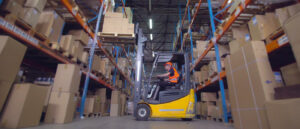A forklift is a piece of industrial machinery featuring a front attachment with 2 large prongs used to lift and move heavy loads of materials. These materials are usually packed or loaded onto a wooden pallet or other platforms.
Forklifts are used in places like warehouses, home improvement stores and work sites to move large loads. They’re also used to place or remove packaged materials from shelves or to load and unload trucks, railway cars, etc. There are also a number of different types of forklifts used to perform various jobs in different locations.
As with any type of heavy machinery, injuries in the workplace are common. Fortunately, workers injured in Alabama are entitled to workers’ compensation benefits for medical expenses and lost wages while they recover.
In October 2022, a 25-year-old woman in Sterling Heights, Michigan, was killed at an auto supplier plant when the forklift she was driving toppled onto its side, falling on her and trapping her underneath.
In July 2022, a worker survived a horrific injury in which his arm was partially ripped from his body in a forklift accident at the State Docs in Mobile, Alabama.
Common warehouse injuries and
how to avoid them
Learn how to keep your warehouse safe! Read our guide on common warehouse injuries and prevention tips to protect your team and business.
Common causes of forklift accidents
Most forklift accidents can be prevented with proper training, concentration and attention to safety procedures. By educating workers about the most common causes of forklift accidents, the majority of injuries can be avoided.
These causes include the following:
- Inadequate or incorrect training of forklift operators
- Errors by forklift operators, such as improper backing, turning and braking
- Malfunctioning or poorly maintained equipment
- Having an oversized load on the forklift
- Operating the forklift with an elevated load
- Disregarding safety procedures in an effort to complete a job more quickly
- Speeding, showing off or otherwise operating the forklift in an irresponsible manner
- Improperly securing loads on a forklift
- Having faded or poorly marked work areas in which a forklift is being operated
Risk factors that increase the likelihood of forklift-related injuries
Additionally, there are several factors that make a forklift-related injury more likely to occur in the workplace. They include:
- Neglecting to give proper warning to others when a forklift is in use in the vicinity
- Being unfamiliar with the areas in which the forklift will be operating, such as narrow passageways, potentially hazardous surfaces, obstructions, etc.
- Having more people on the forklift than safety regulations allow
- Inadequately securing the wheels on railway cars, semis, etc., when being loaded or unloaded using a forklift
Common symptoms of forklift-related injuries
Forklift-related injuries can vary in severity, but given the size and sheer weight of the machinery, they are often serious in nature.
The most common symptoms that result from forklift injuries include:
- Back and/or neck pain that results from sitting/operating machinery for extended periods of time
- Pain related to whiplash, such as dizziness, disorientation, headaches, and poor concentration
- Balance, posture, and lower back problems caused by sitting for long periods of time combined with vibrational shock from operating a forklift
Many symptoms can begin as an annoying cramp when the work day ends. However, over time the pain becomes chronic and can result in more severe damage, which can affect a person’s ability to work at all.
More serious and potentially life-threatening injuries include:
- Broken bones
- Traumatic brain injuries
- Head injuries
- Spinal cord injuries
- Crush injuries affecting muscles, nerves and blood vessels
- Internal organ damage
- Amputations
Overview of Alabama workers’ comp laws and benefits
Under Alabama workers’ comp law, most employers who employ 5 or more employees are required to carry workers’ compensation insurance.
This insurance ensures that employees who become injured on the job will be able to receive benefits, including:
- Medical expenses that have been deemed necessary by a health care provider, such as hospital bills, doctor appointments, medications, rehabilitation, surgeries and medical supplies (like crutches, wheelchairs, etc.)
- Wage replacement to cover two-thirds of your average weekly wages for a period of time that depends on your disability
- Death benefits for dependents who meet certain criteria, including coverage for funeral expenses, wage loss and medical expenses prior to death
Workers’ compensation is a type of no-fault insurance, which means that workers don’t have to prove their employer was responsible for the accident to receive compensation. They only need to prove the injury occurred in the course and scope of their job.
In most instances, injured workers are entitled to workers’ comp benefits even if they caused the accident that led to their injuries.
Steps to take if you are injured in a forklift accident in Alabama
There are specific steps that must be taken to receive workers’ comp benefits in Alabama. They include the following:
- Get medical attention. Any accident involving a heavy piece of machinery should be considered serious, and medical attention should be sought immediately. Alabama is one of the states where your employer chooses the doctor you will see for the treatment of your injuries. Except for emergencies, you must check with your employer to set up an appointment with their preferred medical care provider as soon as possible. You should seek medical attention even if you don’t initially feel injured. Failure to do so can make it harder to prove your injury is work-related and recover compensation.
- Report the accident/injury. Workers’ comp laws in Alabama require the accident/injury to be reported to the workplace supervisor or manager within 5 days of its occurrence. It’s advisable to inform your employer of the incident in writing so there is clear documentation. Keep a copy of the written notification for your own records, including the date, time, and name of the person it was given to. If you’re incapacitated or otherwise unable to give notice to your employer within the 5-day time period, the reporting time may be extended up to 90 days in certain cases.
- Make sure your employer files a First Report of Injury Form. Once the injury has been reported to your employer, it’s their responsibility to complete a First Report of Injury Form. This form will provide necessary information about your injury and your wages.
- Contact an attorney. If your employer refuses to file this form or your claim is denied, contact the Alabama Workers’ Compensation Ombudsman Program or speak with a workers’ comp attorney right away.
Also, please note that in Alabama, a claim for workers’ comp must be filed within 2 years of the date of the accident or you won’t be entitled to any compensation.
Tips for preventing forklift accidents
Taking precautions to prevent forklift-related accidents in the workplace is the responsibility of both employers and employees.
Employees can help prevent accidents by taking the following measures:
- Follow safety protocols and use safety equipment. The number one way to prevent forklift accidents is to be aware of and follow all safety protocols and procedures related to the operation of these vehicles.
- Pay attention. Always give your complete attention to the task at hand when operating a forklift, and pay attention to your surroundings when a forklift is in use.
- Report any forklift issues. Make sure to report any mechanical or functional issues with a forklift to your supervisor immediately.
All it takes is one misstep for a tragedy to occur. Being aware of and adhering to every rule can make a huge difference in creating a safer workplace.
Employers are responsible for the following measures in preventing forklift accidents on the job:
- Ensuring that all equipment is in good working order at all times
- Ensuring all work areas are clearly marked
- Ensuring all employees are aware of safety protocols when they’re in the vicinity of forklifts in use
- Providing proper safety equipment to employees
- Posting easy-to-see signs regarding forklift safety, including warnings of blind corners, pedestrian areas, etc.
- Being aware of unsafe forklift use conditions on their job site, such as rain, ice, snow and wet warehouse floors
The promise of wearable technology and forklift safety
Wearable technology represents a promising direction for improving safety for forklift operators. Imagine forklift operators equipped with wearable devices like smart vests. These vests could monitor their heart rate and fatigue levels, sending alerts when it’s time for a break – potentially preventing accidents like forklift rollovers caused by operator drowsiness.
Or consider smart glasses that provide real-time data about surroundings, helping operators avoid collisions with obstacles or other workers. These tools are practical aids that support operators in maintaining focus and awareness, reducing the risk of workplace accidents.
Contact an Alabama workers’ compensation attorney
Workers’ compensation claims can be complicated, and unfortunately, legitimate workers’ compensation claims are denied every day. If you believe that you’re entitled to workers’ comp benefits in Alabama and your claim is denied, contact the experienced workers’ compensation attorneys at Nomberg Law Firm.
We can help you file a claim, investigate your case and negotiate with your employer and their insurance company to ensure you get maximum compensation. Our attorneys have extensive experience fighting for injured Alabama workers to get them the money they deserve.
About Nomberg Law Firm
Nomberg Law Firm has been helping people in Alabama recover fair compensation for their injuries since 1967. We know our clients are hard-working men and women who deserve the best representation possible. That’s why we’ve dedicated our entire practice to fighting for your rights after an injury.
The small size of our family-owned firm allows us to focus on our client’s needs and enables us to provide individualized assistance and personal attention that larger firms simply can’t match.

